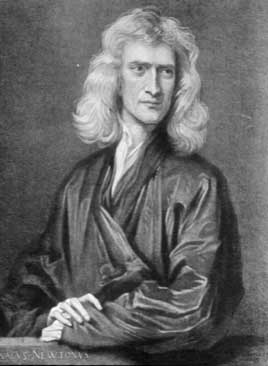 Newton was born in England, in 1642, less than a year after Galileo's death.
He came from a moderately well-off farming family, but with little formal
education. He was not an impressive student in school, and in fact
worked for a while in his late teens for the family business while his peers were
preparing for university. Later he returned to his education, prepared for and
went on to attend Cambridge University in 1661 to study law (at 19 he was a
bit older
than his fellow students). However, his true mathematical genius did not
become apparent for a few more years. In 1663, he began to study more
advanced texts in mathematics when he became interested in learning more
about astronomy and astrology and found he could not understand the
mathematics in it.
Newton was born in England, in 1642, less than a year after Galileo's death.
He came from a moderately well-off farming family, but with little formal
education. He was not an impressive student in school, and in fact
worked for a while in his late teens for the family business while his peers were
preparing for university. Later he returned to his education, prepared for and
went on to attend Cambridge University in 1661 to study law (at 19 he was a
bit older
than his fellow students). However, his true mathematical genius did not
become apparent for a few more years. In 1663, he began to study more
advanced texts in mathematics when he became interested in learning more
about astronomy and astrology and found he could not understand the
mathematics in it.
In 1665 (age 23) Newton received his bachelor's degree. It was just after this time that his mathematical genius began to emerge. However, also at this very time the plague closed the University and he was forced to return home for about 2 years until Cambridge re-opened. It was during this sabbatical time at home that Newton made his most profound discoveries in optics, mathematics and mechanics (the study of energy and forces and its effect on bodies).
Newton invented calculus and designed the first reflecting telescope (called a Newtonian design!) based on his studies of light. For the purposes of this class, we shall limit ourselves to his discoveries in Mechanics, specifically having to do with motion and gravitation. In particular, Newton thought like no one previous to him: Analytically seeing the Universe's motions and recognizing that their existed a force.. a natural influence existing between particles that effected these motions.
Let us begin our explanation of how Newton changed our understanding of the Universe by enumerating his Three Laws of Motion:
Newton's First Law of Motion:
| I. Every object in a state of uniform motion tends to remain in that state of motion unless an external force is applied to it. |
Galileo also recognized this concept of inertia. The first law is often termed simply as the "Law of Inertia". If you consider a uniform velocity defined to be ZERO (a fair answer).. then the 1st Law also says, "objects at rest, stay at rest."